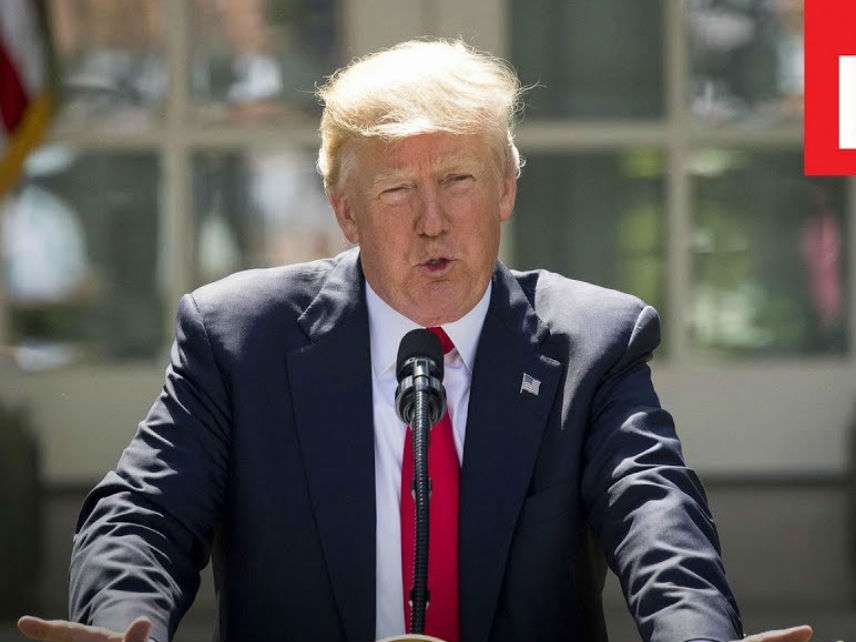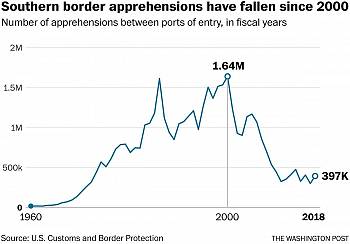The Government Will Always Be Shut Down
Sure, Trump and Congress have reopened Washington for three weeks, but congressional dysfunction and border-enforcement fantasia are with us for the long haul.

President Donald Trump's announcement today that the federal government shutdown is ending for a three-week period of negotiations over border security may have put an end to the 35-day standoff. But there is no escaping the conclusion that the underlying dysfunctions and pathologies that got us to this shambolic point will continue long after this month is in the rearview mirror.
As long as Congress refuses to do its job, and as long as the Republican Party refuses to acknowledge that its monomania about security along the U.S.–Mexico border is based on ignorance, unmeetable expectations, and outright lies, we will be reenacting variations on this unpleasant experience for at least the next two years.
"I think part of the problem with politics is people aren't honest enough about what's going on. And there's a lot of bad going on," Rep. Justin Amash (R–Mich.) told Reason Editor in Chief Katherine Mangu-Ward last Friday at LibertyCon. Like his friend and fellow-traveler Rep. Thomas Massie (R–Ky.), Amash has long been a leading critic of the myriad ways the legislative branch has serially abdicated its most basic of responsibilities in order to preserve electoral viability.
"What we have today is a speakership that is run very much top down," he told Mangu-Ward. "So the speaker dictates everything to everyone, and then all the legislation is take-it-or-leave-it. 'Here's a bill, take it or leave it.'…

"Under Speaker [Paul] Ryan we weren't allowed in the last term to even one time—not even one time!—vote on the House floor to amend legislation. It's the first time in our country's history. And people don't know that. First time in our country's history that members of Congress could not go to the House floor to offer amendments on any legislation. Never happened before….We had a record number of…take-it-or-leave-it bill[s]….So we never really got to legislate."
Congress hasn't passed a proper budget in more than two decades, it has let presidents wage undeclared wars all over the globe, and it has shown little interest in rolling back the executive branch's administrative state. Legislators from the same party as the president openly run interference for the commander in chief, rather than apply the kind of co-equal scrutiny they came into office vowing to exert. Things have gotten so irresponsible that the outgoing House Republican leadership last month tucked into a typically awful Farm Bill reauthorization a provision preventing the 115th Congress from applying the War Powers Act to Yemen.
All of these pathologies have been present in Washington for the entire 21st century; all are objectively getting worse. There is zero reason to expect this sorry trajectory to change.
The same can be said for conservative obsession with "securing the southern border." Both sides in that debate tend to argue as if the federal government hasn't been dumping money, personnel, and construction materials into that issue over the past two decades, and on a bipartisan basis. The number of border guards has doubled, the annual Customs and Border Protection budget has more than tripled, physical barriers have expanded from nearly non-existing to more 650 miles, and yet Republicans act as if nothing has ever been done and Democrats act as if such policies are unconscionable only when the other party does them.
But even though Democrats have not yet landed in a coherent space after the great two-party divergence on immigration beginning in around 2013, it's the restrictionists on the right—and in the White House—who have crossed over into a fantasyland that they show no sign of exiting.
It should tell us something profound that the administration can't seem to open its mouth about immigration-related issues without lying—about criminality, terrorist infiltration, the drug "pipeline," sanctuary cities, the diversity lottery visa, chain migration, illegal-immigrant voter fraud, its own reasons for asking about citizenship in the decennial Census, and so on. This is not just about a president uniquely perpendicular to the truth, though Trump did repeat some of his greatest whoppers this afternoon in the Rose Garden. The same broad sense of factually untethered dystopia has been a feature on the right since the end of the Cold War. Just ask Mitt Romney.
Hyperbole is a tool for those frustrated that facts alone haven't been persuasive enough. Fuse it with the emotions that the immigration issue generates, and the sense of powerlessness that many restrictionists have long felt vis-à-vis the Washington political class, and there's a potentially lavish reward structure for those who peddle dark fantasies about northbound migrants. Just ask Donald Trump. Or Ann Coulter.

The reality is far less exciting. As Nick Gillespie has pointed out in this space, "the number of illegal immigrants in the country is at a 10-year low and the number of people caught trying to enter the country illegally between checkpoints on the Southern border is one-fourth of what it was in 2000 (see chart). Compared to decades past, the majority of illegals enter the country legally and then overstay tourist, student, or work visas. In 2016, the Department of Homeland Security said 170,000 people entered the country illegally outside of border checkpoints while 628,000 people who entered the country legally overstayed visas."
So enjoy these next three weeks, as a do-nothing Congress matches wits with a hysterical president to see just how both sides can continue putting off their respective reckonings. As in today's temporary denouement, the safest bet will always be the option that requires exerting the least responsibility. The government will always be shut down, long after the government shutdown.


Show Comments (86)